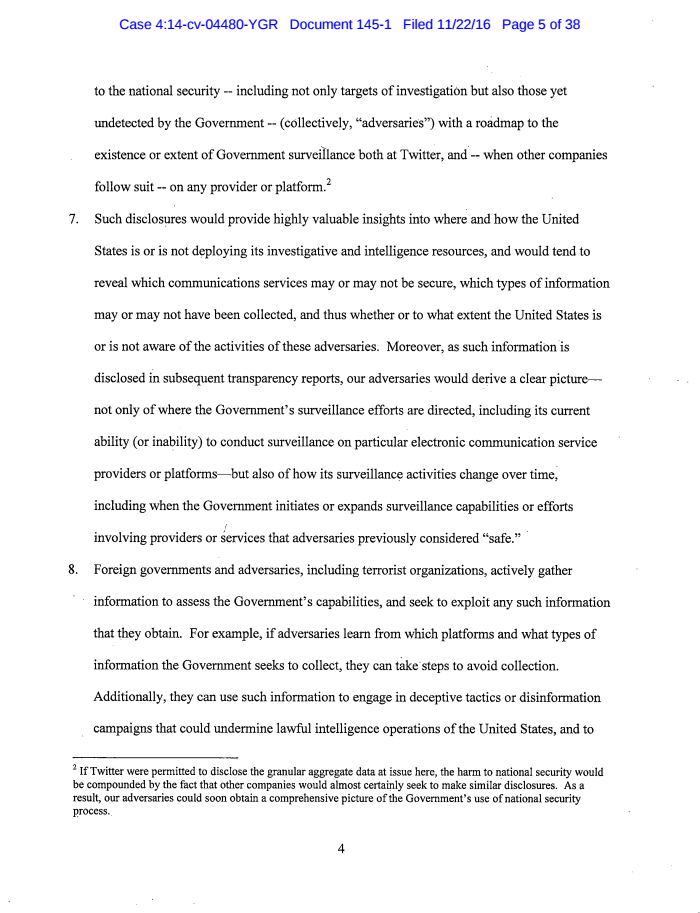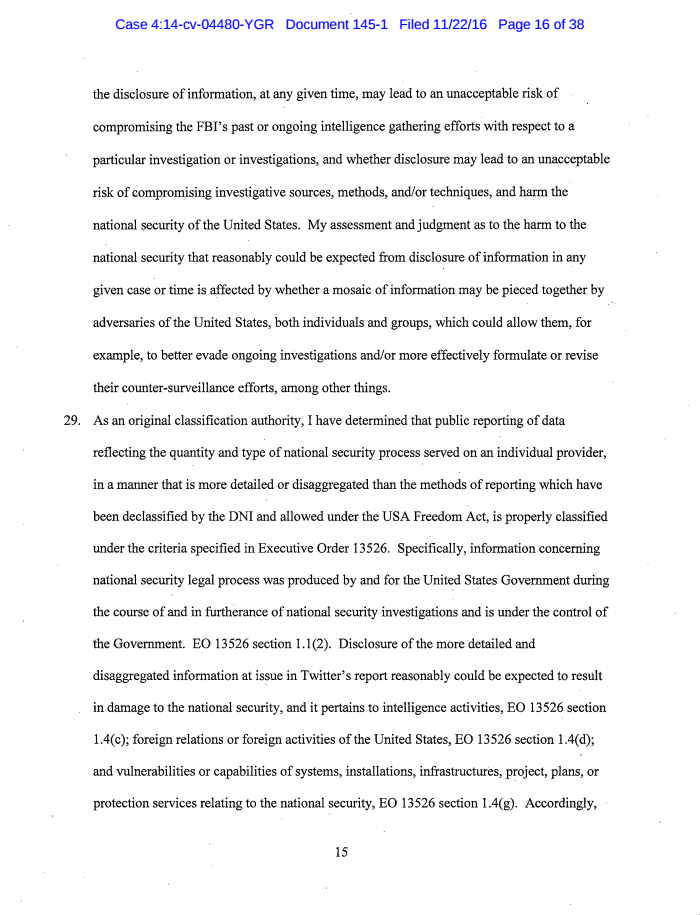It looks like you're using an Ad Blocker.
Please white-list or disable AboveTopSecret.com in your ad-blocking tool.
Thank you.
Some features of ATS will be disabled while you continue to use an ad-blocker.
9
share:
This isn't so much a conspiracy theory as it is passing on information I haven' t seen on ATS yet.
There is a court case involving Twitter, the US government, and the use of "State Secrets" privilege which seems interesting. I know there is another case ongoing where First Amendment privilege is being fought by conservatives against social media platforms like Twitter.
However, this appears to be very different. Twitter is fighting the Government using First Amendment grounds in order to violate its NDA and reveal government "national security" details.
Twitter v. William Barr
3.15.19 - Twitter, Inc. v. Barr, et al., Case No. 14-cv-4480-YGR
Say What?
Twitter wanted their lawyers to get security clearances to review the classified info at issue with these claims.
Document Cloud - Steinbach Declaration, Loretta Lynch Nov 2016
Michael Steinbach, Former Exec. Asst. Director National Security Division FBI


Another interesting tidbit.
Sources and methods, eh? Soft disclosure FBI has access to everything Twitter?
Going back to the Twitter v Barr case doc from March 15th of this year:
What data could Twitter possibly be wanting to publish? Turns out they wanted to publish a classified report. I'll get to that.
There is a court case involving Twitter, the US government, and the use of "State Secrets" privilege which seems interesting. I know there is another case ongoing where First Amendment privilege is being fought by conservatives against social media platforms like Twitter.
However, this appears to be very different. Twitter is fighting the Government using First Amendment grounds in order to violate its NDA and reveal government "national security" details.
Twitter v. William Barr
3.15.19 - Twitter, Inc. v. Barr, et al., Case No. 14-cv-4480-YGR
At the heart of this case is Plaintiff Twitter, Inc.’s challenge to the Government’s determination that Plaintiff may not lawfully publish certain information about the extent to which it has received national security legal process from the Government.
Say What?
This is an appropriate and sensible framework for resolving the key question at issue in this case: whether Plaintiff has a First Amendment right to publish information that the Government has determined is properly classified and the disclosure of which reasonably could be expected to cause serious damage to national security.
Twitter wanted their lawyers to get security clearances to review the classified info at issue with these claims.
Plaintiff insisted that its counsel be granted a security clearance for access to classified information that might be at issue in resolving its claims. The Government made clear its opposition to that request, and that issue was unresolved when the Court ordered the Government to submit its summary judgment motion on the merits, including any classified submission. The Government expressed concern about this manner of proceeding because the classified explanation it would prepare for the Court to demonstrate that the information Twitter sought to publish is classified would itself contain sensitive national security information that was broader and more detailed than Plaintiff or its counsel would know or have reason to learn.
...with the question of access by Plaintiff’s counsel unresolved, the Court ordered the Government to provide its classified explanation on summary judgment or be precluded from doing so later. To avoid such preclusion, the Government submitted the Classified Declaration of FBI Executive Assistant Director Steinbach, see Notice of Lodging of Classified Declaration concurrently with its summary judgment motion to explain why the information Twitter sought to publish is properly classified, including why disclosure of the information reasonably could be expected to result in serious damage to national security.
Document Cloud - Steinbach Declaration, Loretta Lynch Nov 2016
Michael Steinbach, Former Exec. Asst. Director National Security Division FBI


Another interesting tidbit.
As a result, I am responsbile for the protection of classified national security information within the National Security Branch of the FBI and in matters affecting the national security mission of the FBI, including the sources and methods used by the FBI in the collection of national security and criminal information for national security investigations."
Sources and methods, eh? Soft disclosure FBI has access to everything Twitter?
Going back to the Twitter v Barr case doc from March 15th of this year:
After careful personal consideration of the matter, the Attorney General [Barr] has asserted the state secrets privilege to protect the following categories of classified national security information that appear in the Classified Steinbach Declaration:
(i) Information Regarding National Security Legal Process that Has Been Served on Twitter Information regarding national security legal process that has been served on Twitter, including not only the quantity and type of any such process, but also particular information regarding the subject mattter of certain FBI national security investigations as well as the communications targeted with national security legal process.
(ii) Information Regarding How dversaries May Seek to Exploit Information Reflecting the Government's Use of National Security Legal Process[/b] Information describing how adversaries might exploit provider-specific data regarding receipt of national security legal process, both with respect to Twitter and with respect to any other provider.
(iii) Information Regarding the Government's Investigative and Intelligence Collection Capabilities Information would reveal or tend to reveal the Government's collection capabilities.
(iv) Information Concerning the FBI's Investigation of Adversaries and Awareness of their Activities Information revealing specific targets of investigation and activities of adversaries of the United States.
In this case, both EAD Ghattas and Acting EAD McGarrity have determined that Plaintiff’s counsel lacks the required “need-to-know” to access the sensitive national security information at issue.
Moreover, the Court, in its July 6, 2017 Order denying the Government’s summary judgment motion, indicated that, to fulfill the standard of scrutiny the Court held to be applicable, the Government’s presentation must include consideration of specific detail such as
“the volume of any requests involved,” and “an articulation of the inference the Government believes can be drawn from the information Twitter itself seeks to publish.
What data could Twitter possibly be wanting to publish? Turns out they wanted to publish a classified report. I'll get to that.
What makes this more interesting is the length of time this apparently has been going on. While this new case I stumbled on is from this month, the
court case according to Court Listener started back in 2014. Comey was FBI Director and it was a complaint regarding him, Eric Holder, and DOJ?
www.courtlistener.com...
It would seem in the middle of 2014 Twitter sued the FBI and DOJ for unconstitutionally restricting them from disclosing details either way in which they wanted to publish of a drafted government transparency report seemingly regarding surveillance and intelligence gathering using their platform. During the Obama administration.
Government answered with the Steinbach Declaration. Twitter appealed. By the time it went through Whitaker and Barr, state secrets was used to block them again.
With all of the hoopla in today's environment regarding potential FBI/DOJ abuses of FISA, I wanted to get this out there.
What says ATS? If I come across anything else, I'll add it here.
www.courtlistener.com...
1. Twitter brings this action for declaratory judgment pursuant to 28 U.S.C. §§ 2201
and 2202, requesting relief from prohibitions on its speech in violation of the First Amendment.
2. The U.S. government engages in extensive but incomplete speech about the scope of its national security surveillance activities as they pertain to U.S. communications providers,
while at the same time prohibiting service providers such as Twitter from providing their own informed perspective as potential recipients of various national security-related requests.
3. Twitter seeks to lawfully publish information contained in a draft Transparency Report submitted to the Defendants on or about April 1, 2014. After five months, Defendants informed Twitter on September 9, 2014 that “information contained in the [transparency] report is classified and cannot be publicly released” because it does not comply with their framework for reporting data about government requests under the Foreign Intelligence Surveillance Act (“FISA”) and the National Security Letter statutes. This framework was set forth in a January 27,2 014 letter from Deputy Attorney General James M. Cole to five Internet companies (not including Twitter) in settlement of prior claims brought by those companies (also not including Twitter) (the “DAG Letter”).
4. The Defendants’ position forces Twitter either to engage in speech that has been preapproved by government officials or else to refrain from speaking altogether. Defendants provided no authority for their ability to establish the preapproved disclosure formats or to impose those speech restrictions on other service providers that were not party to the lawsuit or settlement.
5. Twitter’s ability to respond to government statements about national security surveillance activities and to discuss the actual surveillance of Twitter users is being unconstitutionally restricted by statutes that prohibit and even criminalize a service provider’s disclosure of the number of national security letters (“NSLs”) and court orders issued pursuant to
FISA that it has received, if any. In fact, the U.S. government has taken the position that service providers like Twitter are even prohibited from saying that they have received zero national security requests, or zero of a particular type of national security request.
It would seem in the middle of 2014 Twitter sued the FBI and DOJ for unconstitutionally restricting them from disclosing details either way in which they wanted to publish of a drafted government transparency report seemingly regarding surveillance and intelligence gathering using their platform. During the Obama administration.
Government answered with the Steinbach Declaration. Twitter appealed. By the time it went through Whitaker and Barr, state secrets was used to block them again.
With all of the hoopla in today's environment regarding potential FBI/DOJ abuses of FISA, I wanted to get this out there.
What says ATS? If I come across anything else, I'll add it here.
a reply to: ucanthandlethetruth
Bumping as this is a great thread.
Funny how a lot of the talking heads are avoiding commenting? Usual Dem/Rep squabbling keeping the front pages busy
Bumping as this is a great thread.
Funny how a lot of the talking heads are avoiding commenting? Usual Dem/Rep squabbling keeping the front pages busy
new topics
-
Swedish Minister for Gender Equality is Seeking Treatment for Phobia of Bananas
Other Current Events: 5 hours ago -
Satanic ‘Little Season’ of Deception.. Awaken to the Handiwork of the Creator.
ATS Skunk Works: 6 hours ago -
USA-BIDEN and CHINA-Xi Agree Not To Let Artificial Intelligence Decide Nuclear Weapons Use.
World War Three: 6 hours ago -
The mysterious death of Aileen Conway
General Chit Chat: 9 hours ago
top topics
-
Does the Trump win mean No More Taylor Swift??
Politicians & People: 17 hours ago, 12 flags -
The mysterious death of Aileen Conway
General Chit Chat: 9 hours ago, 6 flags -
USA-BIDEN and CHINA-Xi Agree Not To Let Artificial Intelligence Decide Nuclear Weapons Use.
World War Three: 6 hours ago, 3 flags -
Satanic ‘Little Season’ of Deception.. Awaken to the Handiwork of the Creator.
ATS Skunk Works: 6 hours ago, 3 flags -
Swedish Minister for Gender Equality is Seeking Treatment for Phobia of Bananas
Other Current Events: 5 hours ago, 3 flags -
Half-Life 2 is 20 Years Old - its Also Free on Steam until the 18th
Video Games: 13 hours ago, 1 flags
9
